Negotiating rent, a battle of wits where keywords like “market,” “vacancy,” and “seasonal trends” become your ammunition, isn’t about luck—it’s about strategy.
Did you know that understanding vacancy rates alone can shift the negotiation power into your hands? A market with over 7% vacancy screams opportunity, a chance to push for lower rent because landlords are sweating to fill empty units.
On the flip side, a market under 3% means you are negotiating from a weaker position.
This is not about wishing for a lower price, it’s about arming yourself with real data.
Consider this: summer months often see rent prices soar by 10-15% due to high demand from families and students, while winter can often provide up to 10% savings due to lower demand, are you ready to use this trend to your advantage?. The key is knowing when to make your move, not just when you are ready.
It’s about aligning with the landlord’s pressure points, think of it like a chess game, you need to know where your opponent is weak, it’s all about timing, it’s the difference between playing on your terms, and paying full price.
Let’s break it down, your approach needs to be as sharp as a finely honed blade.
First, you scout comparable properties, not just admiring the first one you see, but rather, gathering intel.
Websites like Zillow, Apartments.com and Craigslist are your tools, and not just to look, but to really gather information.
Look at sq ft, number of bedrooms, bathrooms, and amenities, and what are other landlords asking for.
Imagine having a list, a carefully compiled table, showing comparable rent prices for the same neighborhood, imagine how useful that information can be:
- 123 Main St: 800 sq ft, 2 bed, 1 bath, $1500, Parking, Laundry
- 456 Oak Ave: 900 sq ft, 2 bed, 2 bath, $1600, Gym, Pool
- 789 Pine Ln: 750 sq ft, 1 bed, 1 bath, $1400, Balcony, Pet-Friendly
This is not guesswork, this is about using the market to back up your requests.
Remember that the rental market is like a tide, knowing when it’s high or low can help you navigate more easily.
A high vacancy rate, above 7%, is your green light to negotiate harder, you will be surprised with how much wiggle room you have during these times, it’s the time where landlords are more likely to make concessions.
However, a low vacancy rate, below 3%, means that you’re in for a tough negotiation.
Also, when it comes to the seasons, summer is typically the peak season with the higher prices, think families moving before school starts.
Winter, however, offers more opportunity because it’s the off season, and less people want to move, and landlords are more likely to offer good deals, it is like a crowded fishing pond versus an empty one, you will get better results when there is less competition.
And what about the timing? It’s everything, it’s the key.
Negotiate mid-month, towards the end of the month, or even during bad weather when nobody wants to move.
These are all times when landlords are under pressure to fill their properties, and that gives you an advantage.
Most leases tend to expire at the end of the month, and if you happen to be looking for places around this time, you have more options and leverage.
Also, if you see more than one vacant unit in the same property, that’s a sign that you have bargaining power. Don’t just go into it blindly.
This isn’t just about asking nicely, this is about leveraging your strategic understanding of the rental market, making the market work for you rather than against you.
Preparation isn’t just about wishful thinking, it’s about knowing your budget, your walk-away point, and understanding your value as a tenant.
It’s like packing for a long journey, you need to have all your gear.
What is your max rent and when will you walk away? Before you start negotiations, create a budget that includes rent, utilities, and other expenses, then decide on a walk-away number that you won’t pass, no matter how much you like a place.
Think of it like having a map, you need to know exactly where you are going, and what will make you deviate from your path.
Highlight your strengths: stable income, good credit score, a positive rental history, and if you have none of those, be honest with the landlord, they will appreciate your candor.
These aren’t just talking points, these are your bargaining chips, showing them that you are reliable and a low-risk tenant.
And don’t walk in without data, gather evidence of market rates, like a lawyer building a case for their client, gather data, use online platforms, local real estate agents, and even walk through your neighborhood to see other properties in the area.
This is about having facts that back your request, not just an idea of what might be fair, it’s about data and facts.
Then comes the art of the ask, where being respectful and direct can make all the difference.
It is not just about what you ask for, but how you ask for it, you need to be clear and polite, but also assertive and direct.
You need to show confidence, and avoid being aggressive.
Speak clearly, state your goals, and present your research in a calm, composed manner.
Think of the negotiation as a conversation, not a battle, and focus on the value, not just the cost, and be ready to highlight how you are a good tenant, and not just someone that is going to pay rent. Focus on the big picture, not just the numbers.
And what about the lease? This is where you can be strategic.
A longer lease is often a chance to bargain for a lower rent, and it’s an option to consider if you like the place and plan to stay long term.
This is because landlords prefer stability, and it saves them money and time when they have long term tenants.
If you are unsure about your future, short term lease might offer better flexibility, even if they are more expensive.
And whatever you do, know what the lease break clause says, this is your escape plan if things don’t go as planned.
Finally, think about appealing to the landlord’s needs, show them that you are a good, reliable candidate, and offer to pay rent in advance if you have the funds.
Discuss lease renewal options, as this can build trust and lead to a long term relationship.
Ultimately, negotiating rent isn’t about being lucky, it’s about being smart, prepared, and strategic.
Understand Your Rental Market
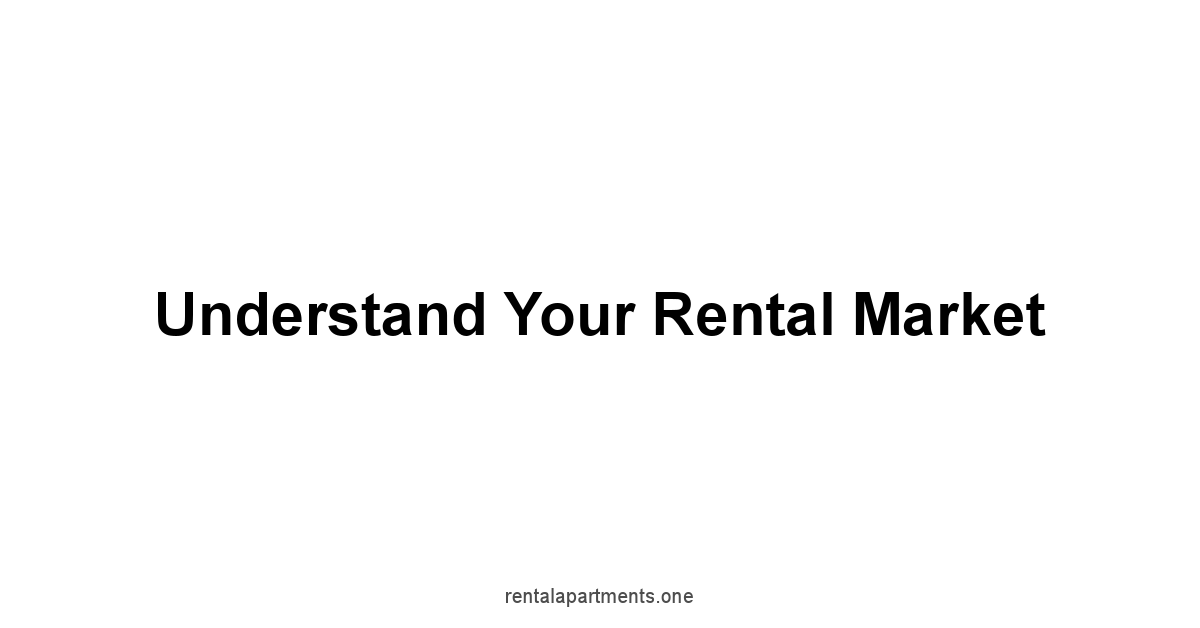
Understanding the rental market is like understanding the rules of a game before you play.
You wouldn’t step into a boxing ring without knowing how to throw a punch, would you? Same goes for renting, you need to know what’s what before you start talking numbers.
It’s about having the facts on your side, knowing what’s happening in your area, and using that knowledge to your advantage.
It is not about getting lucky, it’s about being informed. It’s about research and the ability to use it.
Knowing the market is your first line of defense.
It’s where you find the ammunition you need to negotiate.
Without it, you’re just throwing darts in the dark, hoping to hit something good.
The information available to you can help shape your entire approach to rent negotiations.
It allows you to enter the process with confidence and leverage, instead of just being another person hoping for a break.
Research Comparable Properties
Researching comparable properties is like scouting the enemy camp before a battle, you need to know their strengths and weaknesses to find an opening.
Don’t just look at the first place that catches your eye, dig deep and look at what similar places are renting for.
Think of it like this: if you’re selling a car, you would not just price it out of the blue, you’d see what other cars of the same model are selling for in the area. Renting is no different.
It’s all about the numbers and knowing what others are paying to rent a similar space.
You need to compare apples to apples here.
Look at the size, the number of rooms, the amenities, and the location of other rentals.
Is it close to public transport, how is the neighborhood, and what about parking? Is there a gym, or a pool? These things matter.
Websites like Zillow, Apartments.com, and Craigslist are your tools. Check them, compare them and note them down.
Here is an example of how you can keep track of this information:
| Property Address | Size Sq Ft | Bedrooms | Bathrooms | Monthly Rent | Amenities |
|---|---|---|---|---|---|
| 123 Main St | 800 | 2 | 1 | $1,500 | Parking, Laundry |
| 456 Oak Ave | 900 | 2 | 2 | $1,600 | Gym, Pool |
| 789 Pine Ln | 750 | 1 | 1 | $1,400 | Balcony, Pet-Friendly |
Don’t ignore the little things either.
Things like included utilities, in-unit laundry, or proximity to grocery stores can sway a price. Compile a list, and be critical.
If a place is listed for a higher price but is missing some amenities that other, cheaper properties have, that’s a point you can use.
This research gives you the hard facts to back your negotiation, it is more than just an idea in your head, it’s the market telling you what’s what.
Analyze Vacancy Rates
Analyzing vacancy rates is like looking at the tide, you need to know if it’s high or low, if the boats are coming in or going out.
A high vacancy rate means landlords are having trouble finding tenants, and that puts the ball in your court.
A low vacancy rate, on the other hand, means they have options and you might not have much leverage.
The amount of empty units is a direct reflection of the rental market’s temperature.
It tells you how competitive the market is and how likely you are to negotiate a better deal.
Vacancy rates are your secret weapon, they show how desperate landlords are to fill their units.
When vacancies are high, landlords are more likely to make concessions to secure tenants. This is your moment to strike.
You can find information on vacancy rates through local government websites, real estate reports, or by keeping an eye on how many “for rent” signs you see in your area.
If you notice more vacant properties than usual, it is a sign of a buyer’s market and you can use that to your advantage. Here’s a simple breakdown:
- High Vacancy Rate above 7%: Landlords are likely struggling to fill units. This is your chance to negotiate for lower rent or better terms.
- Moderate Vacancy Rate 3-7%: The market is relatively balanced. There is room for negotiation, but you’ll need to make a solid case.
- Low Vacancy Rate below 3%: Landlords have the upper hand. Negotiation will be tougher.
You can also gauge the vacancy rate anecdotally.
Walk around the neighborhood, look at the buildings, do you see many vacant signs? Are there multiple listings for the same complex? These are all signs that the vacancy rate might be high.
It’s all about being observant, being aware of your surroundings and what they are telling you about the demand for rental properties in that area.
Knowing this, you can come prepared and negotiate with real power.
Know the Seasonal Trends
Seasonal trends are like the wind, they can push you forward or slow you down depending on the direction they are blowing.
In the rental market, it’s the same, some times of the year are better for renters than others.
During certain times, everyone is trying to move, and prices are high.
At other times, the demand drops and it becomes easier to strike a deal.
It’s about knowing these patterns and using them to your advantage.
If you know when the wind is at your back, you’re more likely to reach your destination.
The main seasons to be aware of are summer and winter.
Summer is usually when demand is high, with families moving before the school year starts and college students looking for places for the upcoming semester.
This is when you will find higher prices, and less room for negotiation. Winter, however, is often slower.
Fewer people want to move during the cold months, so landlords are more likely to offer deals to fill their properties.
It’s like the difference between fishing in a crowded pond vs an empty one.
Here are some key seasonal trends to keep in mind:
- Summer May-August: High demand, less negotiation power, typically higher prices.
- Fall September-November: Demand begins to decrease, potential for deals.
- Winter December-February: Low demand, best time for negotiation, typically lower prices.
- Spring March-April: Demand starts to pick up, moderate negotiation opportunities.
Understanding the seasonal trends is more than just knowing when to rent, it’s about maximizing your chances to negotiate effectively.
If you can plan your move for the off-season, when the demand is low, you will have far more leverage.
It’s like the fisherman who knows when the fish are biting, you need to know when the deals are biting and that comes from knowing the market’s trends.
Timing Is Everything
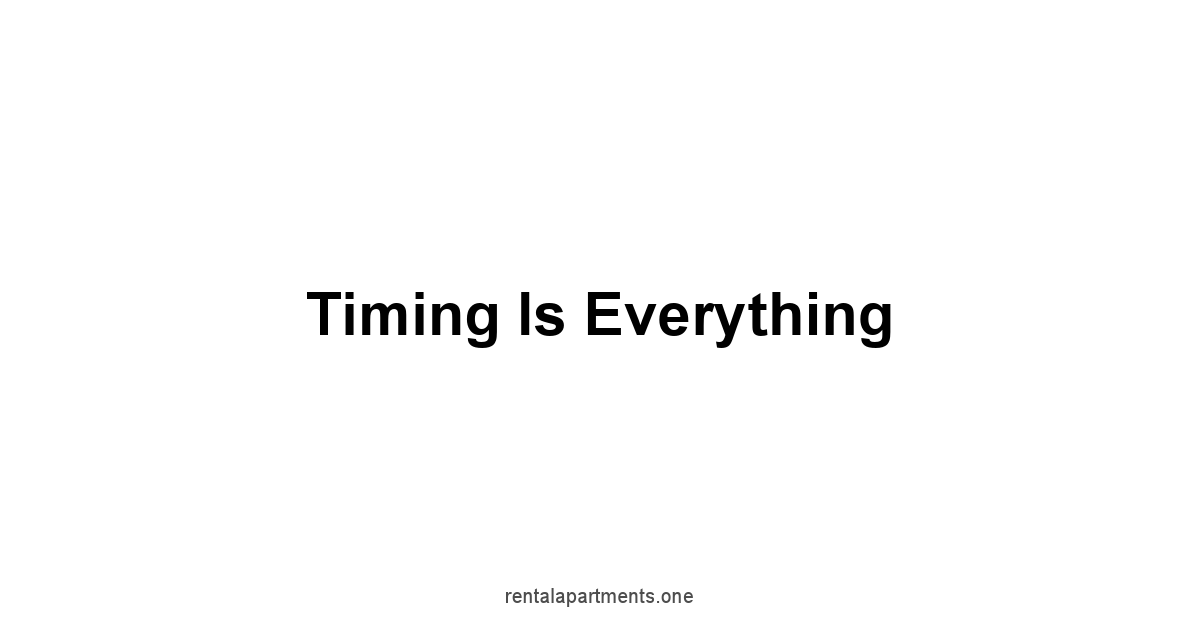
Timing is everything, it is like being in a race, starting at the right time will affect everything.
When it comes to negotiating rent, this could not be truer.
If you approach a landlord at the wrong time, your chances of getting a better deal are greatly reduced.
You need to know the optimal times to make your move, when you have the most leverage, and when the landlords are more likely to be receptive to your requests.
It is about knowing when to push, when to wait, and when to pounce.
The right time can make the difference between paying full price or saving a good chunk of money.
Knowing the rental cycles, when leases expire, and the pressure points that landlords face is just as critical as understanding the market.
It’s all about aligning your negotiations with the landlord’s needs and situation.
By being strategic about when you start your negotiations, you’re not just hoping for a better deal, you’re actively creating a more favorable environment to get one.
The Best Time to Negotiate
The best time to negotiate rent is when the landlord is more likely to be flexible, when they need to fill a property quickly and when there is less competition.
It’s like fishing in a quiet lake, compared to a crowded one.
You need to look at the times where the scales are slightly tilted in your favor.
There are certain periods when landlords are more inclined to make concessions, either because they want to avoid vacancy or because they’re trying to close deals.
This means that the best time to negotiate isn’t always when you are ready to move in, it’s when the landlord needs a tenant more than the tenant needs an apartment.
Here are a few key times when you have more bargaining power:
- Mid-Month: Landlords often prefer to avoid having vacancies in the middle of the month, as it can create accounting issues for them.
- Off-Season: As discussed earlier, winter months typically have lower demand, giving you a chance to negotiate.
- End of the Month: Landlords may be more motivated to fill vacancies and close deals before the month ends.
- During Bad Weather: No one wants to move in bad weather so this might lead to a discount to make sure the unit is not empty.
- When They Have Multiple Units Empty: If you notice multiple empty units in one complex, that gives you more leverage.
Timing is more than luck, it is a strategy.
Approach a landlord at a time when they are more likely to be receptive to negotiations.
If you do it at the right moment, it is not about asking nicely, it is about understanding the pressures and using them to your advantage.
When Leases Usually Expire
Knowing when leases usually expire is like knowing when the tide is going to turn.
Most leases tend to expire at the end of the month, as it makes the most sense logistically for both tenants and landlords.
However, a large number of leases also expire during certain times of the year, like the end of spring or summer.
This means that these times will be very competitive.
Understanding these cycles can give you an edge in negotiations, it’s about seeing the pattern and taking advantage of it.
When leases expire, landlords might be dealing with multiple turnovers, and they want to avoid vacancies as much as possible.
If you are looking during this time, you might have more room to negotiate because they are pressured to fill their vacancies quickly.
Here are a few reasons why understanding lease expirations is useful:
- Higher Vacancies: Near lease expiration dates, you will find higher vacancies, giving you more options, and more leverage.
- Landlord Pressure: Landlords are trying to fill properties before a specific date and avoid vacancies, making them more open to negotiations.
- Move-In Incentives: Some landlords may offer move-in incentives to secure a tenant quickly, allowing you to get a discount or save some money.
Here’s a brief look at the most common lease expiration times:
- End of Spring/Summer May-August: High volume of lease expirations, making it a competitive market for renters, but more room to negotiate.
- End of Fall September-November: Many leases expire after students go back to school and families start settling down after the summer.
- End of Winter December-February: Fewer lease expirations, and landlords are more likely to offer deals because they need tenants.
Knowing when leases expire is about being smart about your approach to rent negotiation.
It is about taking the time to learn about the market and timing your approach in a way that favors you, rather than just going in blindly.
It is about being strategic and making the market work in your favor.
Leverage End-of-Month Pressure
Leveraging end-of-month pressure is like being a closer in baseball, you need to come in at the right time and finish strong.
Landlords often feel the pressure to fill empty units before the month ends, it’s like the last few minutes of the game.
At this time, every vacant unit represents lost income and landlords may be more willing to negotiate to avoid a full month of lost rent.
It’s about understanding that pressure and using it as leverage to get the best deal.
The closer to the end of the month it is, the stronger your position gets.
This is especially true if there are multiple empty units.
Landlords want to start the next month with all or most of their properties occupied, and you can use that to your advantage. Here’s how you can use end-of-month pressure:
- Wait until late in the month: If you are not in a hurry, wait until the last few days of the month before seriously talking about pricing.
- Negotiate with urgency: When a landlord knows you are ready to move fast, they might be more flexible with your demands.
- Be ready to move quickly: If you wait till the end of the month, be ready to move if you agree on a price, it will be more effective.
- Use data to your advantage: Refer to your data about other vacancies and competitive pricing in the area.
- Be direct: Let the landlord know you are aware that they need to fill the units and use that in your negotiation
This is a strategic play, you are not just going to a landlord, you are positioning yourself at a time when their motivations align with yours.
Landlords under pressure are more willing to make compromises, and knowing this gives you a great advantage when it comes to saving money on rent.
Preparing Your Negotiation Strategy
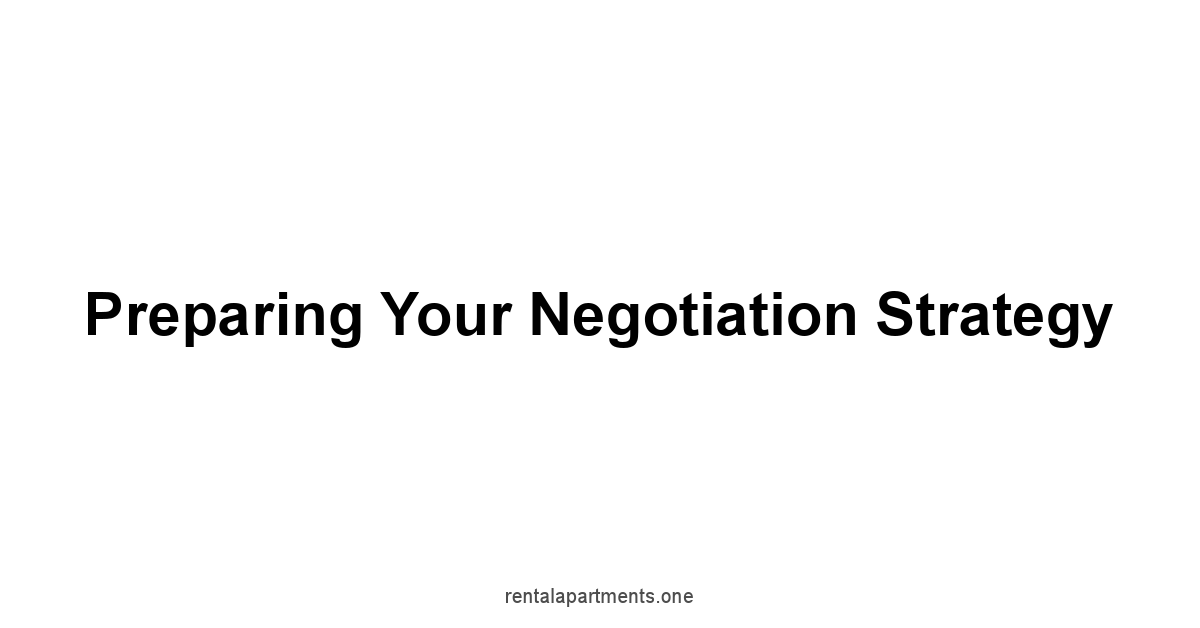
Preparing your negotiation strategy is like packing your bag for a long journey, you need to have everything you need before you leave.
It is more than just knowing what you want, it’s about understanding your own needs, what you can afford, what you are willing to compromise on, and having all the information at your fingertips.
It’s about taking the time to understand the market, your strengths, and preparing to present your case in a way that is both compelling and convincing.
A good negotiation strategy involves knowing your limits, understanding your worth as a tenant, and having evidence to back up your claims.
It is like building a house, you need a strong foundation if you want it to stand strong.
When you walk into a negotiation prepared, you’re not just hoping for the best, you’re actively working towards a positive outcome.
Preparation is the key, and the better you prepare, the more likely you are to get a deal that works for you.
Know Your Budget and Walk Away Point
Knowing your budget and walk-away point is like having a map and a destination for a road trip, if you don’t know where you are going, you will be lost.
You need to know exactly what you can afford, how much you are willing to spend on rent and stick to that.
You also need to decide on the maximum you are willing to pay, and when you will just walk away from a deal.
This will ensure that you are not led astray by the excitement of the moment and that you are making a sound financial decision.
Your budget isn’t just a number, it’s a reflection of your financial situation and your priorities.
You need to consider not just the rent, but also utilities, parking, and any other monthly expenses you might have.
A good budget should be clear and realistic, and you need to be honest with yourself about what you can afford. Here are some things to consider:
- Calculate Total Monthly Expenses: Include rent, utilities, internet, parking, and any other relevant costs.
- Create a Maximum Rent: Determine how much rent fits comfortably in your budget, leaving room for savings and unexpected expenses.
- Determine Your Walk-Away Point: Before starting negotiations, decide on the absolute highest rent you’re willing to pay.
Knowing your walk-away point means having a limit in mind, it’s the line you will not cross, no matter how tempting the deal may be.
It’s about being prepared to walk away from a deal that doesn’t fit your budget, it ensures you don’t overspend on a place. Here is an example:
- Maximum Rent: You can comfortably afford $1,800 per month, including utilities.
- Walk-Away Point: If the rent is above $1,900, you will walk away from the deal, no matter how much you like the place.
Knowing your budget and your walk-away point, gives you the power to negotiate with clarity and confidence.
You are not just going into a discussion blindly, you are going with a plan.
It’s about being in control of the financial aspect of the negotiation and making sure you don’t end up with a deal that puts you in a difficult situation.

Highlight Your Strengths as a Tenant
Highlighting your strengths as a tenant is like showing off your skills in a job interview, you are making your case to the landlord that you will be a good, reliable tenant.
Landlords are looking for people who will pay on time, take care of the property, and avoid problems.
If you can convince them that you fit that description, you have more power in the negotiation process.
It’s about making sure they see you as a valuable asset, not just another renter.
Your strengths are not just about what you think is good, it is about what landlords look for in their tenants. Here are some key areas to highlight:
- Stable Income: Show them that you have a steady job and can reliably pay rent on time.
- Good Credit Score: A good credit score indicates that you have a history of paying your bills. You can share your credit report with the landlord if needed.
- Positive Rental History: If you have a history of being a good tenant, make sure they know. It shows you have a good record.
- Quiet Lifestyle: Landlords often prefer tenants who are quiet and respectful of neighbors.
- No Pets or Smoking: If you don’t have pets or don’t smoke, that can be a bonus to some landlords.
- Long-Term Tenant Potential: Let them know you are looking for a stable long-term place to live, it saves them time and effort.
Here’s a simple way to frame your strengths when talking to a landlord:
“I’ve been at my current job for 5 years and I have a great credit history, showing that I am responsible with my bills.
I have no pets or plans to have any, and I have a quiet lifestyle.”
Your strengths are your leverage, use them to show the landlord you are a good tenant.
It’s not about bragging, it’s about painting a clear picture of a reliable tenant, which makes you a better candidate for them, and gives you the opportunity to negotiate for a better deal.
Gather Evidence of Market Rates
Gathering evidence of market rates is like collecting evidence for a trial, you are making your case with facts and data.
Don’t just walk into a negotiation with a general idea of what things cost.
You need to know exactly what other comparable rentals in the area are going for, that’s the most compelling case you can make.
It’s about presenting a compelling case based on real market data, not just what you think is fair.
Evidence of market rates is the backbone of your negotiation strategy.
It shows that your requests are reasonable and grounded in fact, not just a shot in the dark.
This will show the landlord that you know what you are talking about and you are aware of the market. Here are some ways you can gather this data:
- Online Rental Platforms: Use websites like Zillow, Apartments.com, and Craigslist to compare prices for similar properties.
- Local Real Estate Agents: Agents often have access to current market data and can provide insights into local rental trends.
- Neighborhood Walk-Throughs: Check “For Rent” signs in the area to see what others are listing similar properties for.
- Local Reports: Check for local real estate reports, they often include data about average rental prices in the region.
- Use a table to show your research: Create a table of similar properties with rent and other relevant details
Here’s how you can present your evidence to a landlord:
“I’ve done my research, and it looks like similar units in this area are renting for around $1,600 a month.
For example, is renting for that much and has similar amenities.”
Data is your greatest weapon.
The more evidence you gather, the more solid your argument will be.
This will allow you to enter the negotiations not just with a wish, but with a strong and factual case that the landlord will find difficult to ignore.
It is about using facts and data to back your requests.
The Art of the Ask
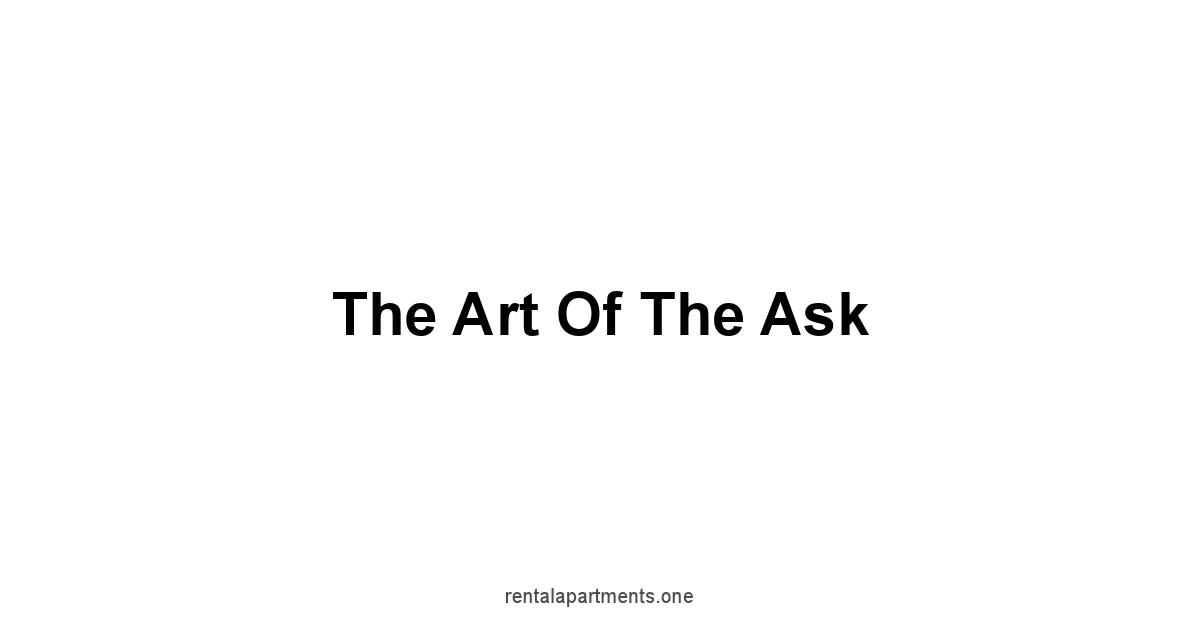
The art of the ask is like a dance, it requires grace, confidence, and timing.
It’s not just about what you ask for, but how you ask for it.
You need to be respectful, clear, and direct in your communication.
You need to present your case calmly, confidently, and not like you are begging for a deal, but as someone who knows what they are worth.
The way you present yourself, and your case, can be just as important as the case itself.
The way you ask can sway a landlord.
It is about being assertive without being aggressive, knowing how to talk to people and not being afraid to speak up. Negotiation is a conversation, not a confrontation.
You want to create an environment where both parties can reach an agreement, which comes from effective communication, being respectful, and focusing on the value you bring.
Keep it Respectful and Direct
Keeping it respectful and direct is like speaking clearly, and without any hidden agenda.
You want to be polite but firm, and not beat around the bush.
Start with a friendly tone, but clearly state what you are looking for, and back that up with your research.
You want to keep the conversation straightforward, without any unnecessary emotions or complex language.
It’s about being clear in your communication, respectful in your approach, and honest in your intentions.
Being respectful means acknowledging that the landlord has a right to get fair value for their property, and that it is not about you vs them.
You don’t want to be rude or demanding, as it is counterproductive.
Being direct means getting to the point quickly, stating your goal, and providing reasons why you think your request is reasonable. Here’s a good approach:
- Use Polite Language: Start with a greeting and use “please” and “thank you.”
- Be Clear in Your Request: Don’t hesitate, state what you are looking to get, without any hesitation.
- Be specific: Provide specific numbers, not vague statements.
- Don’t be Aggressive: Be firm in your ask, but avoid being confrontational or demanding.
- Listen Attentively: Give the landlord the chance to speak and make their case, listen before speaking.
Here is an example of how to approach a negotiation:
“Good morning, I appreciate you taking the time to meet.
I am very interested in this property, and after researching comparable properties in the area, I think a monthly rent of $1,650 would be fair. I’m ready to move in within the next two weeks.”
Respect and directness are not weaknesses, they are the best way to ensure clear and productive communication.
It shows the landlord that you are serious and professional and that you know what you are doing, which can lead to a more productive discussion.
It’s about being professional and getting straight to the point.
Present Your Case Calmly
Presenting your case calmly is like being a seasoned poker player, you keep your emotions in check.
It is about presenting your case clearly, logically, without any sign of desperation or frustration.
You need to present your case logically, with factual evidence and a calm, measured tone.
When you are calm, the other party will listen to your arguments more carefully, and you are more likely to achieve your goals.
Emotional reactions can be a sign of weakness in a negotiation.
You want to avoid getting into arguments or showing frustration, because if you are not calm you will not be able to make your points clearly.
Your calm demeanor will show the landlord that you are reasonable and confident, which makes it more likely that they will take you seriously. Here’s how you can maintain a calm approach:
- Take Deep Breaths: If you feel yourself getting tense, take a moment to breathe deeply.
- Focus on Facts: Support your requests with evidence, data, and facts.
- Avoid Raising Your Voice: Speak clearly and at a normal tone.
- Use Neutral Language: Avoid accusatory or aggressive language.
- Stay Focused on the Goal: Remember what you are trying to achieve and don’t get side-tracked.
Here’s a practical example of staying calm during a negotiation:
- Instead of saying: “This is way too expensive! I can’t afford this!”
- Say: “I understand your price is X, but after looking at comparable properties in the area, I am more comfortable at Y. Is there a way we can come to an agreement?”
Calmness does not mean giving up or being a pushover, it means keeping your emotions in check and presenting your case clearly and logically.
When you stay calm, you remain in control of the conversation, and you are more likely to get the result you are looking for.
It is about keeping your cool and presenting your arguments in a professional and rational way.
Focus on Value, Not Just Cost
Focusing on value, not just cost is like looking at the big picture, not just the price tag.
When you are negotiating, it is not just about how much you are going to pay, but the value you are going to get for that price.
You need to highlight your value as a tenant, and show the landlord the potential benefits of renting to you.
It’s about making sure the landlord sees the total value you bring, not just your rent check.
Focusing on value allows you to move beyond just negotiating the rent and focus on the complete picture, making the negotiation more collaborative, and allows both parties to find a mutually beneficial agreement.
Here are some things you can focus on to highlight your value as a tenant:
- Highlight Your Reliability: Emphasize that you pay rent on time.
- Showcase Your Tenant History: Highlight your good record with previous rentals.
- Mention Your Quiet Lifestyle: Tell them you are respectful of your neighbors.
- Discuss Your Long-Term Plans: Indicate that you are planning to stay long-term.
- Offer to pay deposit early: You can offer to pay security deposit as soon as you agree with a deal.
- Be a good communicator: Be prompt with your responses, show that you are easy to deal with
Here’s how you can frame the conversation:
“I understand that the rent is set at $1,800 a month, however, I have a stable job and an impeccable history with my current landlord.
I am looking for a place to settle in for a long time, which I believe will bring value to you as a reliable tenant.”
By focusing on value, you are showing the landlord that you are more than just someone who will pay rent. You are showing that you bring value and stability.
This will make the conversation more constructive and collaborative, where you are both focused on making a mutually beneficial decision.
It’s about the big picture, and not just the price.
Lease Length Negotiation
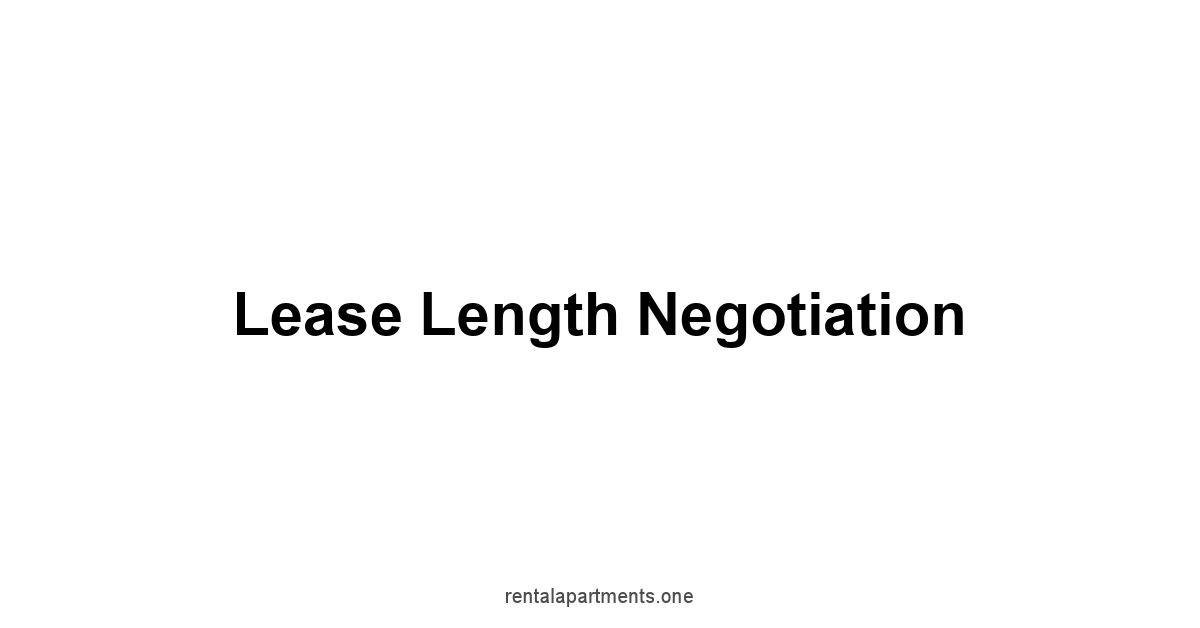
Lease length negotiation is about flexibility, you are negotiating the length of time you are going to rent the property.
It’s a strategic part of the negotiation and allows you to approach the discussions from different angles.
The length of the lease is not just a commitment, it can be a useful tool to get a better deal.
You need to consider both shorter and longer lease options, understand their implications, and use that knowledge to get the best deal for yourself.
The length of your lease affects not just your living situation, but your financial situation as well.
It can be a great point of leverage in negotiations.
Landlords often have different priorities when it comes to lease length.
By understanding what they might prefer, you can negotiate from a position of knowledge.
This allows you to be flexible and make an informed decision that is beneficial to both you and the landlord. It is about taking advantage of the situation.
Longer Lease for Lower Rent
A longer lease for lower rent is like getting a bulk discount, it means committing to stay for a longer period in exchange for a lower monthly rent.
This can be a win-win situation, it provides the landlord with a guarantee of long term occupancy, and you get a lower monthly rent.
It’s about using the length of your lease as leverage to save money, and a strategy worth considering if you plan to stay in one place for a while.
Longer leases provide stability for landlords, since they don’t have to worry about finding a new tenant every year.
This is valuable to them, because of the time and cost they have to spend in between tenants.
It is a win for them, which is a great opportunity for you.
Here are some things to consider when thinking about a long-term lease:
- Landlord Savings: Landlords save on advertising and other costs when they have long-term tenants.
- Guaranteed Income: A longer lease guarantees a stable rental income.
- Negotiation Power: You can use these savings as a point to negotiate a lower monthly rent.
- Future Price Increase: It can protect you from rent increases during the lease period.
- Personal Stability: It gives you more stability, knowing that you won’t have to move soon.
Here’s how you can propose a longer lease:
“I’m planning to stay in this area for a long time, would you consider reducing the monthly rent if I sign a 24-month lease?”
A longer lease can be a powerful tool if you know how to use it correctly, it gives you some security and potentially saves you money.
It’s about knowing that both parties can benefit from long term stability, and using that to your advantage.
Flexibility with Short-Term Leases
Flexibility with short-term leases is like having options on the table, It’s about knowing that short-term leases can be useful for some people, especially if their plans are uncertain.
You need to be able to see that short-term leases offer different types of advantages for landlords and tenants.
It’s about knowing the pros and cons and using them to your advantage if you see a good opportunity.
Short-term leases usually come at a higher price than a long-term lease, but they can be very useful for some situations.
If you are planning to move in a year, or if you don’t know where you will be in the future, having this flexibility can be essential. It is about weighing the pros and cons.
Here are some benefits of considering a short-term lease:
- Flexibility: This gives you the flexibility to move easily if your plans change.
- Trial Period: It allows you to test out a new place or a new neighborhood.
- Temporary Housing: Useful if you need to find short-term housing because of work or other commitments.
- Negotiation: In some cases, you can negotiate better terms on a shorter lease.
Here’s a comparison of long-term vs short-term leases:
| Feature | Long-Term Lease | Short-Term Lease |
|---|---|---|
| Lease Length | Typically 12+ Months | Typically 3-11 Months |
| Monthly Rent | Usually Lower | Usually Higher |
| Stability | High | Low |
| Flexibility | Low | High |
| Suitability | If you plan to stay long-term | If your plans are uncertain |
Short-term leases might be good for some situations, so it is worth considering.
It is about being informed of the available options, understanding the market, and choosing what works best for your particular situation.
It is about being strategic and knowing when to be flexible.
Understand the Lease Break Clause
Understanding the lease break clause is like having an emergency exit plan, it is about knowing what happens if you need to end your lease before its expiry date.
It’s important to know what your lease agreement says about the penalties or fees involved, so that you are not caught off guard.
Knowing this information can save you a lot of trouble and money if you need to move unexpectedly.
The lease break clause is a critical part of your lease agreement that you need to understand.
It is a clear set of guidelines of what you need to do in case you need to leave before your lease is over.
This information should be clear, and not hidden inside long sentences.
Here are some elements of a lease break clause you need to be aware of:
- Notice Period: How much notice you need to give the landlord.
- Early Termination Fees: How much you need to pay to break the lease.
- Responsibility for Rent: Whether you are responsible for paying rent till the unit is re-rented.
- Subletting: If you have the right to sublet the unit to avoid breaking the lease.
- Legal Requirements: Whether your state or city has specific laws about ending a lease.
Here’s an example of a lease break clause to help you understand better:
“If you need to leave before your lease expires, you must give a 60-day written notice and you are responsible for rent until the property is re-rented.
You will also have to pay a termination fee equivalent to two months of rent.”
Knowing the lease break clause means you are prepared for any possible scenario, and it is not just about planning to break the lease, it’s about being prepared in case you have to move.
It’s about knowing your obligations and rights before you sign on the dotted line.
Appealing to Landlord’s Needs
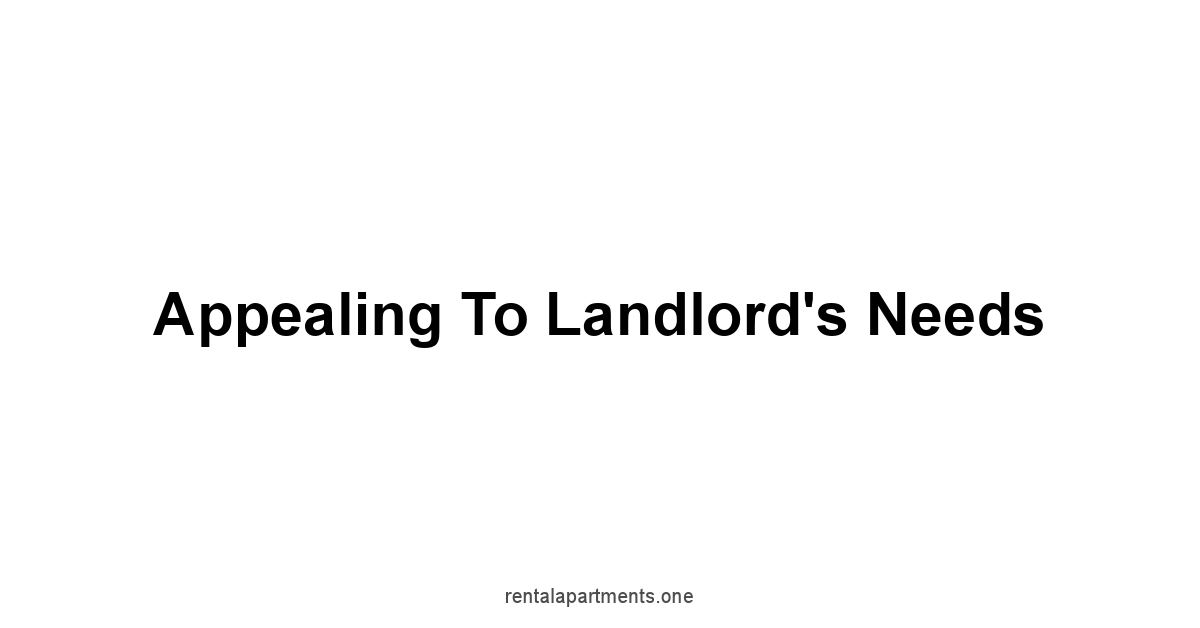
Appealing to a landlord’s needs is like speaking their language, you need to understand what’s important to them and tailor your approach accordingly.
It is not just about you and your needs, it is about finding common ground. Landlords have their own motivations and concerns.
If you understand what is important to them, you are more likely to get a deal that works for you both.
It’s about showing them how you can make their life easier and more profitable.
Landlords are looking for reliable tenants who will pay their rent on time, take good care of the property, and provide a stable source of income.
If you can show them that you meet those needs, you are in a strong position to negotiate.
Understanding what their goals are is a strategic move in any negotiation, and renting is no different.
Offer to Pay Rent in Advance
Offering to pay rent in advance is like showing you mean business, it shows that you are serious, that you have the funds, and that you are ready to make a deal.
Most landlords will appreciate this kind of assurance, as it gives them a good upfront payment that will help with their monthly income goals.
It shows that you are a serious candidate, which can give you an advantage in negotiations.
It is about knowing that showing financial stability is always a good strategy.
Paying rent in advance can be a huge point in your favor during negotiations.
This shows that you are a reliable tenant with available cash, which is an appealing quality for landlords.
Here are some of the benefits of offering to pay rent in advance:
- Reduces Landlord Risk: By paying in advance, you are reducing risk for the landlord.
- Shows Financial Stability: This demonstrates that you have the funds, and that makes you a good candidate.
- Opportunity for Discounts: Landlords may be willing to offer a discount for this commitment.
- Good First Impression: It makes a strong first impression, showing you are serious.
- Increased Negotiation Power: It gives you extra leverage to make the deal work.
Here’s how to propose paying rent in advance:
“I am very interested in this property and I am willing to pay three months’ rent upfront if we can agree on a favorable monthly rent.”
Paying rent in advance shows confidence and it makes you an appealing option for a landlord.
It’s a great way to show your financial stability and negotiate a better deal for yourself.
It is about using your financial power to get what you want.
Discuss Lease Renewal Options
Discussing lease renewal options is like planning for the future, it opens the conversation about what happens after the initial lease.
It shows you are thinking long-term and that you are looking for a stable place to live.
This can be beneficial to landlords who want to keep their tenants and avoid vacancies.
It’s about showing your commitment and starting a conversation about your intentions.
Lease renewal discussions can be a good way to start building a good relationship with your landlord, and also open opportunities for further negotiations in the future.
Landlords prefer to keep good tenants, so discussing this can benefit both parties.
Here’s how discussing lease renewal options can be a strategic move:
- Shows Long-Term Interest: Landlords prefer tenants who are willing to stay for a while, saving them the hassle of finding new ones.
- Opportunity for Negotiation: It opens opportunities for negotiations if you agree to renew.
- Creates Relationship: It builds trust with your landlord and makes future discussions easier.
- Avoids Future Problems: It gives both parties time to plan ahead if there is no intention to renew.
- Increases Your Value: Knowing that you are willing to renew makes you a valuable tenant.
Here’s how to approach the subject:
“I’m interested in this property long term and I’d like to discuss the possibilities of renewing the lease if everything goes well during the first year.”
Discussing lease renewal options will help you create a good relationship with the landlord and opens the opportunity to negotiate favorable conditions in the future.
It is a good step to establish trust and communication.
Highlight Your Reliability
Highlighting your reliability is like showing off your references, it proves to the landlord you are a dependable tenant.
You need to make it clear that you will pay rent on time
Final Thoughts
Negotiating rent is not a game of chance, it’s about strategy, preparation, and knowing your worth.
You’ve got to understand the market, research your comparable properties, and analyze the vacancy rates in your area like a seasoned detective.
Don’t forget to time your negotiations strategically, aiming for those moments when landlords are more willing to make a deal, like the end of the month or during the off-season.
With the right information, you’re not just asking for a lower rent, you’re making a sound case based on market realities.
According to recent reports, tenants who research their local rental market and are able to present comparable pricing data have a 15% higher success rate in negotiating rent reductions.
Remember that preparing your negotiation strategy is like planning a journey.
Knowing your budget and walk-away point is your map and destination, and it makes sure that you are making a financially sound decision.
Highlight your strengths as a tenant – that steady job, those good credit scores and a solid rental history will make the landlord see you as a valuable tenant.
Never go in empty-handed, always have the evidence of current market rates.
It is not enough to think that you are a good tenant, you have to show it, and use it to get what you want.
When it’s time to talk numbers, remember, respect and directness are your allies.
Keep the conversation calm and focused on the value you bring.
It is not just about the cost but about the benefits you bring to the landlord, highlight that you are stable, that you can be trusted to pay rent on time, and that you are a long-term tenant.
Don’t forget to use the lease length to your advantage, whether it is a longer one, in exchange for a lower price, or a short-term option that offers the flexibility you need, the key is to see how you can use this to negotiate a deal you will like.
Ultimately, rent negotiation is about understanding the landlord’s needs as well.
Offering to pay rent in advance is a very strong move that will make them look at you like a reliable tenant.
Always discuss lease renewal options, and show that you are thinking long-term, you are not just there to rent for one year and move on.
In the end, it’s about being prepared, knowing your worth, and making a compelling case that benefits both you and the landlord.
That way you aren’t just getting a deal, you are making a smart financial move.
Frequently Asked Questions
What should I know about the rental market before negotiating rent?
You need to know the game before you play.
Research comparable properties, analyze vacancy rates, and understand seasonal trends. It’s about having the facts, not luck.
This gives you leverage, it’s the ammunition you need for a negotiation.
How do I find comparable properties to help me negotiate?
Look at the size, rooms, amenities, and location of other rentals.
Websites like Zillow, Apartments.com, and Craigslist are your tools. Make a list.
Note the little things that matter: included utilities, laundry, and store proximity.
If a place is pricier but missing amenities, it’s a point for you.
What do vacancy rates tell me and how do I use them?
Vacancy rates are the tide. High vacancy? Landlords are desperate. Low vacancy? They have options.
Check local government websites and real estate reports.
Or, walk the neighborhood and look at the “for rent” signs. High vacancies are your chance to strike.
When is the best time to negotiate rent?
Timing is everything, it is like being in a race.
Landlords are more flexible mid-month, off-season, and at the end of the month.
Bad weather and multiple empty units can also help your case.
Know when they need you, it’s more than just being polite.
How do I handle lease expirations when negotiating?
Leases expire at the end of the month, mostly.
Spring and summer see a lot of expirations, which means higher competition but also more opportunity to negotiate. Landlords want to avoid vacancies, use that.
If you are strategic and know the market it can work for you.
What is the end-of-month pressure and how can I leverage it?
Landlords feel the pressure to fill units before the month ends.
Closer to the end of the month, the stronger you are. Use data about other vacancies. Be ready to move fast, if you agree on a price.
It’s about knowing their pressure points, and using them.
What should I know about my budget before negotiating?
Know your limits, what you can afford and when to walk away.
Calculate all monthly expenses, not just rent, and decide your maximum, it’s your line you won’t cross.
Be honest with yourself, be realistic, and do not let the excitement make you overspend.
How do I highlight my strengths as a tenant?
Show landlords you are reliable.
They want someone who pays on time, takes care of the property, and avoids problems.
Highlight stable income, good credit, positive rental history, and a quiet lifestyle. Be clear about being a good tenant.
How can I gather market rate evidence for rent negotiations?
Don’t just guess, gather facts.
Use rental platforms, talk to real estate agents, check for “for rent” signs, and look for local reports.
Create a table of similar properties with rent and other details. This is your evidence, your strongest case.
How should I approach negotiating with the landlord?
Be respectful, clear, and direct.
State what you want, and back it up with your research. Don’t beat around the bush.
Be assertive but not aggressive, and keep emotions in check. This is a conversation, not a fight.
How can I present my case calmly and effectively?
Keep emotions in check. Breathe deeply.
Speak clearly, avoid raising your voice and keep your language neutral. Stay focused on the goal. Present facts logically. Be like a seasoned poker player, keep your cool.
Should I focus on value or just cost when negotiating rent?
Focus on the total value you bring, not just your check.
Highlight your reliability, good history, and long-term plans. This helps you make the negotiation collaborative. It’s about the big picture.
How can a longer lease benefit me when negotiating rent?
A longer lease can be a win-win.
It provides stability for the landlord and can get you a lower rent. If you plan to stay, it’s good leverage.
It also protects you from rent increases during the lease period.
When are short-term leases a good idea?
Short-term leases are good when your plans are uncertain, or if you want a trial period in a new neighborhood.
They provide flexibility, but usually come at a higher price.
Know when it suits you, and use it to your advantage.
What should I know about the lease break clause?
Understand the lease break clause, know your emergency exit.
Check the notice period, fees, and responsibility for rent. This is your safeguard.
Don’t get caught off guard if you need to leave early.
How can I appeal to a landlord’s needs during negotiations?
Speak their language. They want reliable tenants.
Offer to pay rent in advance, discuss lease renewal options, and highlight your reliability.
This shows that you’re a serious candidate, and can be beneficial to both of you.
How can offering to pay rent in advance help me?
Paying rent in advance reduces the landlord’s risk, and shows financial stability. It can also give you more negotiating power. It’s a strong move, if you are able to do so.
Why is discussing lease renewal options important during negotiation?
Discussing lease renewal shows you are thinking long-term. Landlords prefer tenants who want to stay. It can build trust, and open future negotiations.
It shows your commitment, a good way to start a long-term relationship.
Why is it important to highlight my reliability when negotiating rent?
Highlighting your reliability, proves you are a dependable tenant.
Show them that you are going to pay on time, take care of the property and be respectful.




